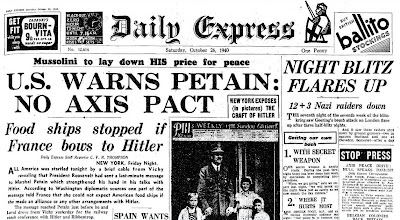26 October, 2010
Day 109 - Battle of Britain
There is no official or semi-official information as to the scope of the conversation between Hitler and Marshal Petain. A statement issued by the official German News Agency says: "Hitler did not hesitate to treat the Marshal as a great and honourable opponent deserved to be treated." That is the "take" from the Yorkshire Post. Others, like the Daily Mirror, hint at "surrender", and the Daily Express covers US intervention, aimed at stopping a Franco-German pact.
Noting Petain's discomfort, evidenced by the protracted negotiations, the Express cannot resist the temptation to moralise. "Now you see what it is like to be beaten. Look at France. Look at Petain creeping to the feet of the conqueror, asking what it is he wants," the paper storms. "As we watch each step of that dreadful and pitiful pilgrimage we sing anew the praises of our invincible Navy and our unbeatable Air Force".
Several newspapers focus on yet another gun duel across the Straits of Dover, the narrative running to a pattern established back in late August when the German shelling started. The German guns shell a convoy - unusually, German aircraft join in. The British guns respond. British bombers roar into action, launching the biggest raid yet on German-occupied France. Honour is satisfied. The warriors stand down, clean their guns and finish off the day with a late tea, or something stronger. Alan Brooke and others fret about the enormous expenditure of manpower on Winnie's "pets".
For the rest, it is déjà vu all over again. A small number of jabos and their escorts fly across the Channel and head towards London. Like the day before, and the day before that, and the day before that, some actually get to drop their bombs over the city. This time, the Royal Chelsea Hospital is hit.
The RAF flies 732 sorties, nine German aircraft are destroyed as are nine RAF fighters - by no means all, on either side, through combat damage. Two Hurricanes are lost on night take-offs, their pilots killed, and one Blenheim crashes on landing after a night sortie. The crew is unhurt. Additionally, two Beauforts, a Blenheim, two Hudsons, a Hampden and a Whitley are lost by Bomber and Coastal Commands. The FAA loses a Swordfish.
The big event though - not yet broadcast to the nation - is a Luftwaffe attack on the former liner and now troopship the Empress of Britain. She is found by a roving Condor about 150 miles from land, off the north-west coast of Ireland. Hptm. Bernard Jope, the aircraft captain, releases two bombs on the ship. He then strafes her, taking return fire from deck-mounted machine guns.
The bombs start large fires which soon cripple the ship. Many crew are trapped below deck by the fires, some forced to escape through portholes into the sea. A Sunderland and three Blenheims assist with the rescue. Under constant air cover from Hurricanes from No. 245 Sqn out of Aldergrove, the ship limps eastwards, only to be torpedoed by U-32 on 28 October while under tow.
Most of the 643 passengers and crew are taken off. Only 45 are killed, all passengers in the initial attack. At 42,348 grt, she is the largest liner to be sunk through the entire war. Jope is eventually to become a senior Captain with Lufthansa. U-32 is sunk by the destroyer Harvester, two days after she despatches the Empress.
Back in Britian, the creatures of the night are on the prowl again. They hit London and Birmingham heavily. New Street station in Birmingham is closed by an unexploded bomb. But for some, the war has become a spectator sport once more. The Daily Express reports thousands of people crowding Kent seafronts to watch and hear "terrific battles between convoys, planes and long range guns which shook the coast from early yesterday evening to long after dark," as German long-range guns, with the aid of a terrific bombing by the RAF, lit up the whole French coast between Calais and Boulogne.
COMMENT: Battle of Britain thread
Subscribe to:
Comments (Atom)



